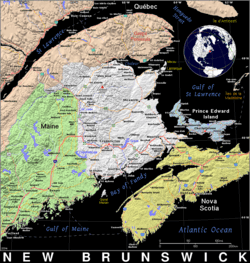Exploring Online and Print Resources for Genealogists
Americans usually feel pride in discovering Revolutionary War soldiers in the family tree, but there’s also no shame in finding you have “Tories,” more properly called Loyalists, among your ancestors. In some cases, as I did, you may discover that you have both not only within your family tree, but even within one family.

Not too long ago, I was researching a Loyalist family from New York who emigrated to New Brunswick, Canada, after the Revolution, and I wanted to increase my knowledge about these Americans who wanted so badly to remain British subjects that they would leave their homes for a new land.
I found Liberty’s Exiles¹, by Maya Jasanoff, and I recommend it to anyone who is interested in exploring the Loyalist experience. In the New York Times Sunday Book Review, Thomas Bender, who teaches American history at New York University, called the book a “smart, deeply researched and elegantly written history” of the Americans “who made the choice to embrace imperial Britain.”²
In many more cases than not, Jasanoff tells us, Loyalists objected to the same injustices that spurred the Patriots to fight for independence, but they felt that justice could be achieved within a continued relationship with Great Britain.
I think there is a tendency to think of Loyalists as fat cats who were primarily interested in their own economic well-being. But Jasanoff, a Harvard history professor, shows us that Loyalism crossed socio-economic boundaries and was a result of a complicated interweaving of factors having to do with the heart as well as with the pocketbook.
Jasanoff follows the fortunes of Loyalists from all social strata and conditions, including the Indian nations who fought for the Crown and free and enslaved Blacks in the Revolutionary era. Slaves were offered freedom if they fought with the Redcoats, and many ran away from their masters and joined the British side. Thousands who remained enslaved became refugees along with their Loyalist owners after the British defeat.
I had been familiar with the evacuation of Loyalists to Nova Scotia and New Brunswick as a result of my genealogy research, but I learned that the Loyalist diaspora was much more extensive than just flight to Canada. Loyalists fled to Britain, the West Indies, northern Africa, India, and other parts of the British Empire.
It’s an amazing American story and Jasanoff tells it well.
Sources
- Maya Jasanoff, Liberty’s Exiles: American Loyalists in the Revolutionary World (New York: Alfred A. Knopf, 2011).
- Thomas Bender, “The King’s Men, After the American Revolution,” The New York Times Sunday Book Review, 29 April 2011, online archives (http://www.nytimes.com/2011/05/01/books/review/book-review-libertys-exiles-by-maya-jasanoff.html?pagewanted=all&_r=0 : accessed 02 September 2014).
